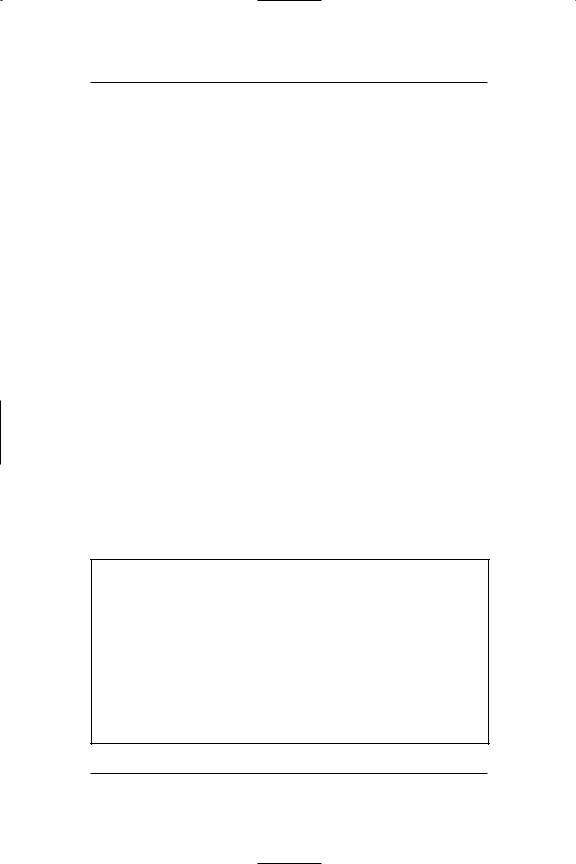
Allen J.G. - The Complete Q&A Job Interview Book (2004)(4th ed.)(en)
.pdf
SUITABILITY FOR TARGET JOB
method. I’m a quick study and know I would pick it up fast.
(If no:)
I don’t have specific experience in that area, but I have a great deal of related experience that will help me learn quickly. I have a natural ability for ______________
(numbers/computers/manual dexterity/sales), which I’m confident will enable me to learn the job in record time.
26. Are you willing to start as a trainee?
(If you are willing to accept an entry-level position:)
Yes, definitely. This is a new area for me, and I believe in getting a good foundation in the basics before progressing. I also have a great deal of knowledge and work experience, which I’m sure will contribute to my rapid progress through the basics. If I learn at my usual rate, I expect to be assuming greater responsibility when it becomes available.
(If you already know the job, and taking a step backwards would not be in your best personal or professional interests, try to leverage that knowledge like this:)
I’ve had ____ years of background in this field already. While I know I’ll need to learn the specific methods and procedures this company uses, I’m a trained and experienced person.
I’d be wasting your management’s time as a trainee, and that wouldn’t be in the company’s best interests.
131

CHAPTER 7
The knowledge I bring with me qualifies me for the higher level position of ________________.
27.Are you looking for permanent or temporary work?
(You wouldn’t like to be looking for a permanent position and find yourself hired for a job that lasted only six months. So understand the employer’s point of view. Don’t take it too seriously, though. After all, life is a temporary assignment!)
I’m looking for permanent work, a position with challenge and responsibility, that will allow me to develop as I meet those challenges and handle that responsibility.
Temporary work is for people who haven’t decided what they want to do with their lives. I have a carefully considered career plan and am looking for the right company that will help me fulfill that plan—while I help it grow and become more profitable.
28.In five minutes or less, tell me why this company should hire you.
(What an opportunity! Portions of what you will answer might have been covered in your answers to earlier questions, but here’s a chance at center stage for five whole minutes! That’s about as long as the average sales presentation. You’re getting a chance to screen-test us-
132

SUITABILITY FOR TARGET JOB
ing a role you play every day! So develop a succinct, convincing sales presentation, and don’t forget to close with a happy ending.
Use the following sample presentation for a job as a sales representative with a pharmaceutical company to get ideas for your five-minute monologue. Pay attention to the words and phrases in italics: They are examples of effective use of interview vocabulary. Then write your own presentation in the lines that follow this sample answer and rehearse it!)
You need a self-starter who can handle a large territory and deal regularly with a variety of people—from hospital purchasing agents and directors of nursing to private physicians. You need someone who can take objectives and systematically meet them using creative approaches.
I’ve proven my ability to work with people and numbers and to handle big responsibility with a minimum of supervision. In my previous sales work, I usually exceeded my quotas. Further, I filed my paperwork on time, expediting order processing and shipping. I’m a high-energy person who doesn’t leave until the work I have to do is done.
My employers have always been satisfied with my sales totals. Just as important, my customers were always pleased with the follow-up, support, and service I offered. These things are crucial to succeed in this business. When you’re dealing with medicine and other pharmaceuticals, your customers need to know there is someone available to answer questions and to deal with problems that might arise in patient application. I’ll
133

CHAPTER 7
work hard to establish a presence with the doctors and hospitals.
The customer contact and public relations experience I gained from my other, nonsales, jobs will also help me deal with all the different personalities I’ll encounter on a daily basis.
Finally, my degree in biology gives me the scientific knowledge to understand the technical aspects of this product line and to discuss it intelligently with physicians and other health-care professionals.
(The close:)
Based on this, my ability, experience, skill, and personality match the requirements and diverse responsibilities of the position. Most of all, I really want this job. I know time will confirm your decision to hire me.
(Now, you write the script. You’ll be surprised how easy it is. After all, you’re writing about your favorite subject—you! Welcome to center stage. Spotlights on! Get ready for a standing ovation when you’re through.)
____________________________________________________
____________________________________________________
____________________________________________________
____________________________________________________
____________________________________________________
____________________________________________________
____________________________________________________
____________________________________________________
____________________________________________________
____________________________________________________
___________________________________________________.
134

SUITABILITY FOR TARGET JOB
29.What makes this job different from your previous one?
(Only you can answer this question with specific differences in job requirements and duties. That’s why it’s imperative that you know the target job well. If there are differences, list them; then:)
Jobs are like people: If two people focus on their similarities rather than their differences, they get along better and accomplish more. If I focus on what I know and can do, I’ll learn the less familiar tasks as I go along, and I’ll be contributing right from the start.
30. Why do you want to enter this field?
From the research I’ve done, there appears to be tremendous opportunity in this field. The possibilities seem limited only by the imagination and energy of those in it.
I want to spend my career in an industry and a company where the horizon is always expanding, and there is always new territory to cover. When I wake up in the morning, I’d like to anticipate the possibility that I’ll learn something new or solve a problem I’ve never faced before—one that will require all my talent.
In summary, I want to be where things are developing, changing, and growing. And I want to make a meaningful contribution to that development and growth.
135

CHAPTER 7
31.What do you think about how we run our operation?
From everything I’ve seen and heard, I’m very impressed.
From my outside research, the way my first telephone inquiry was handled, and our discussion here, I see a vibrant, responsive organization. A good measure of a company is in the enthusiasm of its employees, and the people here sure demonstrate that.
32.Do you think your lack of ____________ (a degree/experience) will affect your ability to perform the job?
(No degree:)
No, I don’t think it will have an adverse effect. Even though I might not have the traditional academic letters after my name, I’ve learned a great deal, both in my job and on my own, that will help me perform the duties required by this job.
Education is an ongoing process throughout life. I have a great deal of respect for formal education, and I acquired all that time, money, and circumstances would allow. But I find myself learning all the time. When it comes to my job, I’m very practical: If something will make me better at what I do, I want to learn all I can about it. If it won’t, then it can wait.
I’m confident I have the knowledge and skill to get
136

SUITABILITY FOR TARGET JOB
the job done and even to find new ways of doing it more efficiently and effectively.
(Lack of experience:)
Even though I might not have years of experience in this profession, I have the knowledge necessary to make an impressive start and the willingness to learn and improve. I have the skills required by this position. I learn quickly and will work hard to prove myself.
Sometimes employers can do better when they hire people who don’t have a great deal of repetitive experience. That way, they can train these employees in their methods and ways of doing the job. Training is much easier than untraining.
And when you’re required to prove yourself, there’s a healthy tension at work, like the mainspring that moves a watch. When that spring releases, momentum is working in your favor. I think you’ll be impressed by how quickly I learn and how much I accomplish in this position.
33. Aren’t you overqualified for this job?
Although I already know the job we’re discussing, my background will enable me to eventually expand it into something more. I might be more qualified than others you’re considering, but every job can be enhanced by being creative.
With my qualifications, I can do the job right away. Then the company will benefit from my additional
137

CHAPTER 7
experience, and I’ll be able to do more with the position than has been done in the past. In that way, I’ll continue to be challenged—and you’ll be acquiring someone with additional potential.
I’ve learned many techniques for improving the efficiency and productivity of this type of operation. I’d welcome the opportunity to use what I know to improve things here.
So while I might be starting out at a slightly lower level of responsibility, this company is growing and going places. I see a lot of opportunity here.
138

Chapter
8
Salary
Negotiations

CHAPTER 8
DELIVERY
The rule of thumb is: Don’t discuss salary until you’ve been given a clear indication that you’re the preferred candidate (or one of a short list). Yet this rule can be tough to follow, and diversionary tactics can quickly develop into something of a power struggle between you and the interviewer—which is not what you want. Salary negotiations should be the starting point for your employment with a company; that is, ideally, you will have been offered a position before talk of money begins. Of course, the operative phrase here is “should be,” because unfortunately, often salary negotiations may begin before you even walk across the company’s threshold—most commonly, on an application form or during a screening interview over the phone with a representative of the human resources department of the company, who has been instructed to do some preliminary weeding of the candidates. Your goal is to not show your hand until you have a clear idea of what the position is and what the employer thinks it—and you—are worth; the employer’s goal is to save time, and potentially money, by establishing as quickly as possible an opening bargaining position.
Note It’s important to distinguish between salary history and salary requirements, because they really are two separate issues. Salary history should be (but isn’t) illegal to ask about (after all, what does another employer’s idea of your value have to do with this employer’s assessment?). Even if it had some marginal significance, benefits and job duties are never the same.
140
